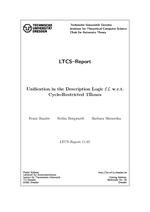LATPub711: Unterschied zwischen den Versionen
Aus International Center for Computational Logic
Marcel Lippmann (Diskussion | Beiträge) KKeine Bearbeitungszusammenfassung |
Marcel Lippmann (Diskussion | Beiträge) KKeine Bearbeitungszusammenfassung |
||
| (2 dazwischenliegende Versionen desselben Benutzers werden nicht angezeigt) | |||
| Zeile 5: | Zeile 5: | ||
}} | }} | ||
{{Techreport | {{Techreport | ||
|Title=Unification in the Description Logic | |Title=Unification in the Description Logic EL w.r.t. Cycle-Restricted TBoxes | ||
|Year=2011 | |Year=2011 | ||
|Month= | |Month= | ||
| Zeile 15: | Zeile 15: | ||
}} | }} | ||
{{Publikation Details | {{Publikation Details | ||
|Abstract=Unification in Description Logics (DLs) has been proposed as an inference service that can, for | |Abstract=Unification in Description Logics (DLs) has been proposed as an inference service that can, for example, be used to detect redundancies in ontologies. The inexpressive Description Logic EL is of particular interest in this context since, on the one hand, several large biomedical ontologies are defined using EL. On the other hand, unification in EL has recently been shown to be NP-complete, and thus of significantly lower complexity than unification in other DLs of similarly restricted expressive power. However, the unification algorithms for EL developed so far cannot deal with general concept inclusion axioms (GCIs). This paper makes a considerable step towards addressing this problem, but the GCIs our new unification algorithm can deal with still need to satisfy a certain cycle restriction. | ||
example, be used to detect redundancies in ontologies. The inexpressive Description Logic EL is | |||
of particular interest in this context since, on the one hand, several large biomedical | |||
ontologies are defined using EL. On the other hand, unification in EL has recently been shown to | |||
be NP-complete, and thus of significantly lower complexity than unification in other DLs of | |||
similarly restricted expressive power. However, the unification algorithms for EL developed so | |||
far cannot deal with general concept inclusion axioms (GCIs). This paper makes a considerable | |||
step towards addressing this problem, but the GCIs our new unification algorithm can deal with | |||
still need to satisfy a certain cycle restriction. | |||
|ISBN= | |ISBN= | ||
|ISSN= | |ISSN= | ||
| Zeile 43: | Zeile 34: | ||
year = {2011}, | year = {2011}, | ||
} | } | ||
}} | }} | ||
Aktuelle Version vom 25. März 2015, 16:34 Uhr
Unification in the Description Logic EL w.r.t. Cycle-Restricted TBoxes
Franz BaaderFranz Baader, Stefan BorgwardtStefan Borgwardt, Barbara MorawskaBarbara Morawska
Franz Baader, Stefan Borgwardt, Barbara Morawska
Unification in the Description Logic EL w.r.t. Cycle-Restricted TBoxes
Technical Report, Chair for Automata Theory, Institute for Theoretical Computer Science, Technische Universität Dresden, volume 11-05, 2011. LTCS-Report
Unification in the Description Logic EL w.r.t. Cycle-Restricted TBoxes
Technical Report, Chair for Automata Theory, Institute for Theoretical Computer Science, Technische Universität Dresden, volume 11-05, 2011. LTCS-Report
- KurzfassungAbstract
Unification in Description Logics (DLs) has been proposed as an inference service that can, for example, be used to detect redundancies in ontologies. The inexpressive Description Logic EL is of particular interest in this context since, on the one hand, several large biomedical ontologies are defined using EL. On the other hand, unification in EL has recently been shown to be NP-complete, and thus of significantly lower complexity than unification in other DLs of similarly restricted expressive power. However, the unification algorithms for EL developed so far cannot deal with general concept inclusion axioms (GCIs). This paper makes a considerable step towards addressing this problem, but the GCIs our new unification algorithm can deal with still need to satisfy a certain cycle restriction. - Bemerkung: Note: See http://lat.inf.tu-dresden.de/research/reports.html.
- Forschungsgruppe:Research Group: AutomatentheorieAutomata Theory
@techreport{ BaBM-LTCS-11-05,
address = {Dresden, Germany},
author = {Franz {Baader} and Stefan {Borgwardt} and Barbara {Morawska}},
institution = {Chair for Automata Theory, Institute for Theoretical Computer Science, Technische Universit{\"a}t Dresden},
note = {See http://lat.inf.tu-dresden.de/research/reports.html.},
number = {11-05},
title = {Unification in the Description Logic {$\mathcal{EL}$} w.r.t.\ Cycle-Restricted {TB}oxes},
type = {LTCS-Report},
year = {2011},
}
